Download Pdf [4,89 MB] - MTU Aero Engines
Download Pdf [4,89 MB] - MTU Aero Engines
Download Pdf [4,89 MB] - MTU Aero Engines
Create successful ePaper yourself
Turn your PDF publications into a flip-book with our unique Google optimized e-Paper software.
Customers + Partners<br />
Progressing in<br />
a concerted effort<br />
<strong>MTU</strong> <strong>Aero</strong> <strong>Engines</strong>’ conviction is that research needs wiggle room to thrive. For innovative propulsion systems are<br />
the outcome of complex development processes that originate in curiosity and ideas, springing from a visionary force<br />
that blossoms best when unfettered by commercial interests. Concepts holding promise are then pursued to production<br />
maturity in a second step. In that sense, <strong>MTU</strong> sees itself as a partner of science, sponsoring innovation potential<br />
also beyond the confines of the company turf.<br />
Aircraft engine construction has undergone<br />
tremendous change in the past 100 years.<br />
While the Wright Brothers in 1903 still had<br />
only a 12-horsepower four-cylinder engine to<br />
power their first flight, the Airbus A380<br />
mega-transport today commands the enormous<br />
takeoff thrust of four times 76,500<br />
pounds. Intervening between these two landmarks<br />
are many decades of research and<br />
development in which engineers and scientists<br />
from across the globe worked incessantly<br />
to produce ever better engines. Their<br />
drive and commitment today is needed more<br />
than ever. Because in view of the accelerated<br />
growth of commercial aviation and dwindling<br />
natural resources, engine solutions are<br />
needed that resolutely lower fuel consumption<br />
and achieve ever higher efficiencies.<br />
By Andreas Park<br />
They will become a reality, however, only<br />
when the world’s best experts from every<br />
discipline pool their knowledge and methodically<br />
channel it into innovative propulsion<br />
solutions true to the motto ‘jointly towards<br />
progress’, a maxim <strong>MTU</strong> champions through<br />
cooperative activities with research institutions<br />
and universities worldwide. They generate<br />
valuable contacts with the independent<br />
research and development community. Dr.<br />
Jörg Sieber, who supervises innovation management<br />
at <strong>MTU</strong>, says that the resulting<br />
know-how network actually is more of a<br />
staged model. “We enter into science partnerships<br />
in three different stages of intensity.<br />
We begin with a regular technology dialog<br />
with the professional public, then transition<br />
to discussions with our expert circles on select<br />
advanced technologies and finally end<br />
up with long-term technology partnerships.”<br />
<strong>MTU</strong> cooperates with the IWS in Dresden to perfect<br />
the laser powder cladding technique.<br />
Turbine blade with a vapor-deposited zirconium oxide<br />
coating as a heat barrier. This is where <strong>MTU</strong> is closely<br />
collaborating with the DLR research establishment.<br />
For <strong>MTU</strong>, interdisciplinary collaboration has<br />
become a priority, considering that the development<br />
of innovative engines demands<br />
know-how of enormous breadth and depth.<br />
Expertise is required from the most diverse<br />
areas, such as aerodynamics, thermodynamics,<br />
sensor systems and materials research.<br />
This is why <strong>MTU</strong> brings together specialists<br />
from industry, science and research on individual<br />
technology topics. The ‘compressor<br />
expert circle’ initiated in partnership with the<br />
DLR German <strong>Aero</strong>space Center, for instance,<br />
hooks up some 30 scientists of diverse backgrounds.<br />
“In a sense, we’re seeing ourselves<br />
also as some type of moderator pulling the<br />
disciplines together and so unleashing new<br />
stimulus,” explains Sieber.<br />
<strong>MTU</strong>’s part in all this is to focus on the implementation<br />
of new technologies. Its prime con-<br />
The Clean demonstrator went through its first<br />
test ordeal at the Stuttgart University’s altitude<br />
test facility, the only one of its kind in Germany.<br />
cern is to take innovative products to production<br />
maturity. In contrast, at universities<br />
and research institutes, research proceeds<br />
entirely free of commercial targets. This freedom<br />
is an essential requirement, for it provides<br />
scope for new ideas. <strong>MTU</strong> therefore<br />
funds select research projects, but makes no<br />
attempt to steer them. “This creates a winwin<br />
situation,” says Prof. Dr. Klaus Broichhausen,<br />
chairman of the Bauhaus Luftfahrt<br />
and former chief consultant, technology programs<br />
at <strong>MTU</strong>. “The scientists are afforded<br />
entirely new options, and the company benefits<br />
from forthcoming results.” <strong>MTU</strong> therefore<br />
funds universities and research institutes<br />
to the tune of three million euros annually.<br />
Add to that more than two million euros<br />
a year spent on concrete project sponsorships.<br />
These moneys are funding some 80<br />
institutes and 150 research projects globally.<br />
<strong>MTU</strong> and the DLR in Cologne are jointly working on<br />
an active noise control program. Going through trials<br />
here are frequency superposition systems.<br />
Additionally, <strong>MTU</strong> experts also accept lectureships<br />
at universities, support seminars<br />
with their know-how and assist with degree<br />
and doctoral theses. They further enable<br />
excursions to be made into industrial reality.<br />
This proximity to academe is crucial for an<br />
innovation-driven company like <strong>MTU</strong>. “To develop<br />
globally leading propulsion technologies,<br />
a company also needs the best engineers<br />
to be had globally,” says Sieber. <strong>MTU</strong><br />
is winning this talent for itself while the<br />
young people are still in their studies, and so<br />
discriminately builds the company’s knowledge<br />
lead.<br />
For additional information, contact<br />
Dr. Jörg Sieber<br />
+49 <strong>89</strong> 14<strong>89</strong>-2513<br />
Further information is available on the<br />
Internet at: www.mtu.de/report<br />
18 REPORT REPORT 19


![Download Pdf [4,89 MB] - MTU Aero Engines](https://img.yumpu.com/5322947/10/500x640/download-pdf-489-mb-mtu-aero-engines.jpg)
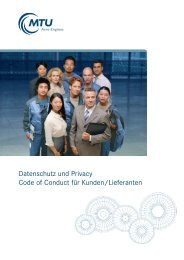
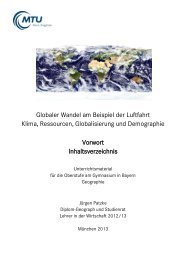
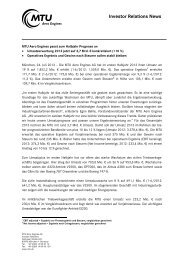

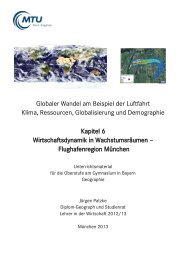
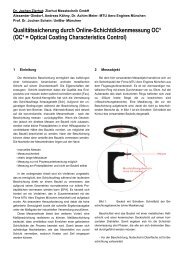
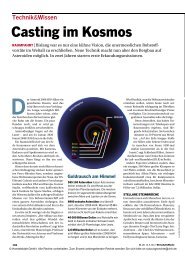

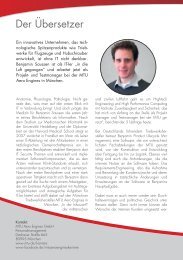
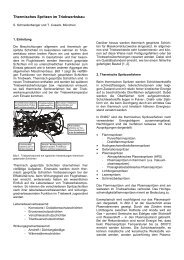
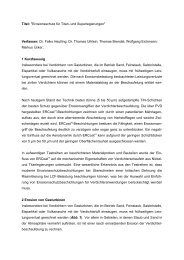
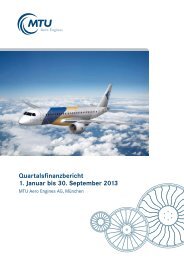
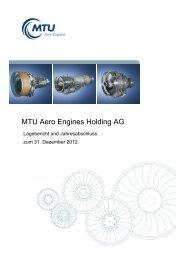
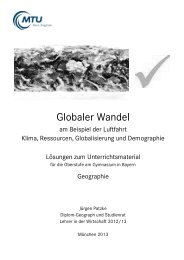
![Download PDF [5,37 MB] - MTU Aero Engines](https://img.yumpu.com/21945461/1/190x125/download-pdf-537-mb-mtu-aero-engines.jpg?quality=85)